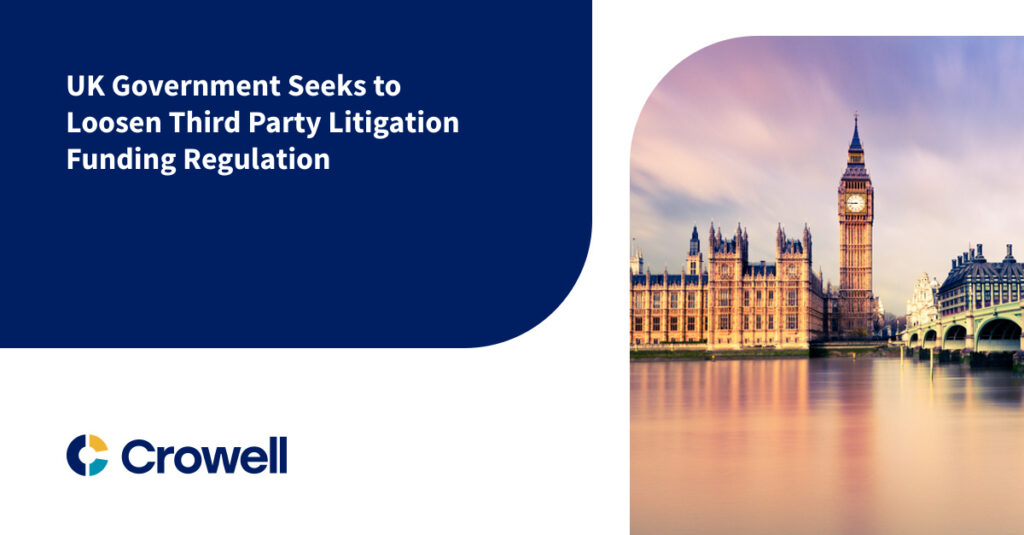On March 19, 2024, the government submitted a bill to nullify the law, following a commitment from the Ministry of Justice. R (on application of PACCAR Inc & Ors) v Court of Competition Appeal and Ors [2023] UKSC 28. The impact of this decision was discussed in the advance warning and subsequent commentary, which discussed the impact on group competition litigation and the original government reform proposal. If the Bill is passed, agreements providing third party funding for litigation or defense activities in the UK will no longer need to comply with the Indemnity Agreements Regulations 2013.DBA rules”) To have coercive power.
In the Litigation Funding Contracts (Enforceability) Bill, the Government is proposing an explicit retrospective amendment to section 58AA of the Courts and Legal Services Act 1990. This excludes “litigation funding agreements'' from the requirements of “indemnity-based agreements'' and defines litigation funding agreements as follows:
(3A) For the purposes of this section, litigation funding agreement means an agreement that provides for:
(a) A person providing claims management services (“Funder”) provides funding (in whole or in part).
(i) the provision of advocacy or litigation services (by anyone other than the Funder) to a recipient of claims management services (a “Litigation Party”);
(ii) the payment of any costs that a litigant may be required to pay to another person under a costs order;
(b) The litigant shall make payments to the funder in the circumstances specified in the contract.
The key part of proposed subsection (3A)(a)(i) is the following wording:by someone other than the funder”. The intent is clearly to carve out third-party funding arrangements from the DBA Regulations and target only funding agreements entered into by service providers (i.e. lawyers). packer The Supreme Court has ruled that third-party funding arrangements “Claim management service” may be caught.Contract based on compensation for damages” Requirement. This amendment excludes litigation funding agreements, as defined, from potential consideration as indemnity-based agreements for the purposes of Section 58AA and the DBA Regulations. You do not need to comply with DBA regulations to be effective.
Strictly speaking, this amendment does not completely remove “claims management services” from relevance to the DBA Regulations. Any other form of service as defined in section 419A of the Financial Services and Markets Act 2000, even if remuneration for those services isPayments are determined with reference to the amount of economic benefit obtained” From the positive outcome of the claim against the recipient of the services in litigation.
In addition, the funder must comply with the terms of 'claims management' as defined in section 4(2)(e) of the Compensation Act 2006 and section 89 of the Financial Services and Markets Act 2000 (Regulated Activities) Order 2001. The broader concept of “activities'' needs to be kept in mind. The new position proposed under this Bill with respect to compliance with DBA rules will mean that persons carrying out regulated claims management activities that are not permitted in the UK will be subject to section 23 of the Financial Services and Markets Act 2000. may be found guilty of a criminal offense.
Given the bill's simplicity and public resonance with the benefits of third-party funding for consumer class actions and other “David vs. Goliath” scenarios, the chances of this reform passing Congress in time to dissolve Congress are slim. I don't think it's unreasonable. The next election must be held by early 2025.
Meanwhile, the Digital Markets, Competition and Consumers Bill has almost completed its consideration in Parliament and is expected to become law. However, a previously proposed government amendment to allow the use of litigation funding arrangements in opt-out class competition cases was defeated in Parliament. Instead, a recent Ministry of Justice press release announced plans for what has become the Litigation Funding Arrangements (Enforceability) Bill, suggesting the government may launch a consultation on broader reforms to litigation funding. did. As noted above, the suspension of elections could delay more comprehensive reforms.


